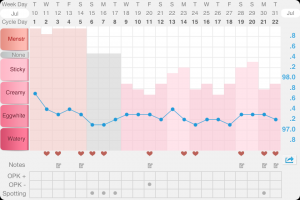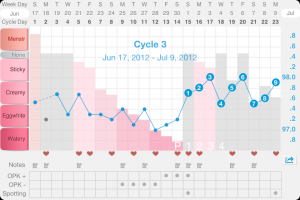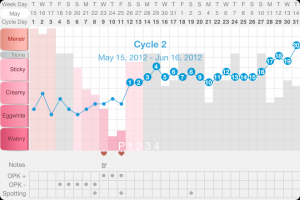Have you ever been concerned because your period was late? I know I have. But I’m not anymore! And you don’t have to be either! And since I’m sure you’d rather not spend several days every month nervously pacing and counting dates backwards on your hands while glaring at the general vicinity where you guess your uterus is, I’ll tell you how.
It’s simple:
LEARN ABOUT YOUR BODY!
Your period is not a Rolex watch; it was not specifically crafted in Switzerland to accurately tell time. A woman’s reproductive system is designed to … wait for it … reproduce! It takes into account all kinds of things when determining whether or not “now” is a good time to try and have a baby, and not ONE of those things is what day it is.
“Oh rats! I’m late for … uh … me ….” This is something your period will never say. Think about it for a second. Your period is late? For what? For itself? Do you see how insane that is?
Whether or not, and when, a woman gets her period each cycle depends on a slew of hormonal events, which can be influenced by many things, such as diet, environmental and emotional stress, and on and on.
So let’s take things from the top and see why you think your period is “late,” shall we?
To begin, there is a theory that all women used to cycle with the moon. They would ovulate at the full moon, and they got their period with the new moon. But there is some evidence that suggests that the amount of ambient light in your bedroom while you’re sleeping at night can influence your cycle, in the same way that the moon supposedly did.
So if we are basing the notion of a “standard 28 day cycle” off when we used to cycle with the moon, we’re all pretty much screwed! Think of your bedroom — your alarm clock, a charging cell phone, a streetlamp, a light from under the door because your roommate is on another ‘Friday Night Lights’ bender: most of us do not sleep in a room where the only light is moonlight.
To further confuse matters, women who are on the pill “get their period” at around the same time every month, but anyone who knows anything about the pill knows that is not an actual period. It’s a bleed caused by the body’s withdrawal from progesterone on the week of placebo pills.
So we’ve got these two things that mislead women into thinking that their cycle should be 28 days. One of my colleagues who has been teaching the Fertility Awareness Methodfor years says that she’s never had a client whose cycle was the same exact length every single time.
Period not arrive when you thought it would? Let’s take a look at your chart, it could be several things:
If you actually learn about what is going on in your body each cycle, and chart your fertility using the symptothermal method, you will be able to see and understand what is actually happening with all your heretofore “mystery bits.”
1. You haven’t ovulated yet, which means that a period is a ways off. You might experience breakthrough or withdrawal bleeding later, but this would not technically be a true menstruation.
2. You ovulated and are currently in your luteal phase, which appears up until now, to be of a normal length. Depending on how long your luteal phases typically are, you could have a better idea of when to expect your period, and if that day passes with no period, let’s see what’s behind door number 3.
3. You ovulated and are currently in your luteal phase, which appears to be longer than normal, which could indicate pregnancy. (Or in very rare cases, a luteal cyst.)
You see, there is always a reason that your period has not come yet, if you’re waiting on it. Certainly, you could say I’m just arguing semantics, but the truth of the matter is that your period is never “late,” it is doing exactly what your body is telling it too. The trick is to understand your body, rather than blame it and stare wistfully up at the moon, hoping it will work its sweet, sweet magic on your uterus.
Chart your cycle, and you’ll always know what the deal is.
Doooooooo it.
Editor’s note: Click on images to view at full size.





hi, its urgent! my last period was on 28 march – 5 days.today it is 4 may but there is no sign of periods. i have no cramps or pain at all..which i normally always had b4 getiing my periods. im alot worried as i do NOt want to be pregnant. i had once sex on 13 april. my husband wore a condome. i dont use any contraception. ive also done two urin pregnancy test today n yesterday but were negative. ill do the test agin in a few days.
but i ve noticed some strange thing by end of march. in which i had heavy sweating during night sleep only for a few days. i had to chnage my top.after this i started to get sckne problem on my back.(shoulder area) n then i also becam lil pimples on my Forehead. both these things i mean sweating n ackne ended after few days… i never had this b4. why did i had this ?? do u know the reason..
ps. im afraid that i might be pregnant..but im not ready for it. incase im pregnant i wud like to have an abortion but i read its better to do asap upto 9 weeks with medical abortion..whom should i contract if i get pregnant for abortion as i dont want to waste any time. i live in UK..pls help thx jasmin
Hi Jasmin,
If your pregnancy tests are negative, but you still think you are pregnant, it’s a good idea to talk with your doctor.
Best of luck to you,